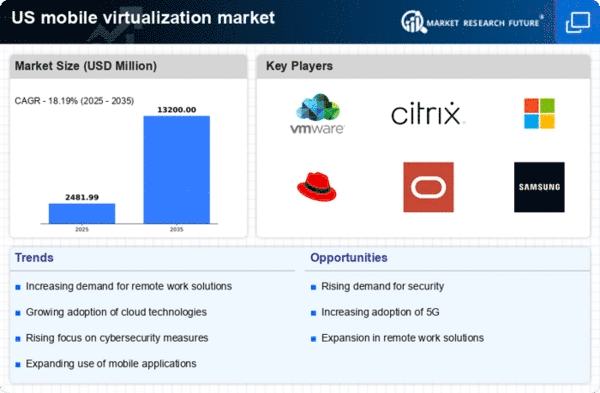Advancements in Mobile Technology
Advancements in mobile technology are playing a pivotal role in shaping the mobile virtualization market. The rapid evolution of mobile devices, including smartphones and tablets, has led to increased capabilities and performance, enabling more sophisticated virtualization solutions. As mobile hardware becomes more powerful, the potential for running complex applications and services on mobile platforms expands. This trend is evidenced by the fact that the mobile virtualization market is anticipated to reach a valuation of $10 billion by 2026. Furthermore, the integration of 5G technology is expected to enhance connectivity and speed, facilitating seamless access to virtualized environments. Consequently, advancements in mobile technology are likely to drive innovation within the mobile virtualization market, as organizations seek to leverage these developments to improve operational efficiency and user experience.
Growing Adoption of BYOD Policies
The growing adoption of Bring Your Own Device (BYOD) policies is a significant driver of the mobile virtualization market. Organizations are increasingly allowing employees to use personal devices for work purposes, which necessitates the implementation of mobile virtualization solutions to ensure secure access to corporate resources. This trend is particularly prevalent in industries such as technology and finance, where flexibility and productivity are paramount. Market data indicates that approximately 70% of companies have adopted some form of BYOD policy, highlighting the need for effective mobile virtualization strategies. By enabling secure access to applications and data on personal devices, organizations can enhance employee satisfaction and retention while maintaining control over sensitive information. Thus, the growing adoption of BYOD policies is likely to continue fueling the expansion of the mobile virtualization market.
Increased Focus on Cost Efficiency
Cost efficiency is emerging as a critical driver in the mobile virtualization market. Organizations are increasingly recognizing the financial benefits associated with mobile virtualization technologies, which allow for the consolidation of resources and reduction of hardware expenditures. By leveraging virtualization, companies can minimize the need for physical devices, leading to substantial savings in maintenance and operational costs. Market analysis suggests that businesses can achieve up to 30% savings on IT infrastructure costs through effective implementation of mobile virtualization solutions. This financial incentive is compelling, particularly for small to medium-sized enterprises that may have limited budgets. As a result, the increased focus on cost efficiency is likely to propel the growth of the mobile virtualization market, as organizations strive to maximize their return on investment while enhancing their technological capabilities.
Rising Need for Enhanced Data Security
The mobile virtualization market is significantly influenced by the rising need for enhanced data security. With the proliferation of mobile devices and the increasing frequency of cyber threats, organizations are prioritizing the protection of sensitive information. Mobile virtualization technologies offer robust security features, such as data encryption and secure access controls, which are essential for safeguarding corporate data. According to recent statistics, nearly 60% of organizations report that data security concerns are a primary driver for adopting mobile virtualization solutions. This heightened focus on security not only mitigates risks but also fosters trust among clients and stakeholders. As businesses continue to navigate a complex threat landscape, the demand for secure mobile virtualization solutions is expected to grow, further driving the mobile virtualization market.
Growing Demand for Remote Work Solutions
The mobile virtualization market is experiencing a notable surge in demand for remote work solutions. As organizations increasingly adopt flexible work arrangements, the need for secure and efficient mobile access to corporate resources becomes paramount. This trend is reflected in the market data, which indicates that the mobile virtualization market is projected to grow at a CAGR of approximately 15% over the next five years. Companies are investing in mobile virtualization technologies to enable employees to access applications and data seamlessly from various devices, thereby enhancing productivity and collaboration. This shift not only supports remote work but also aligns with the broader digital transformation initiatives undertaken by businesses across various sectors. Consequently, the growing demand for remote work solutions is a significant driver of the mobile virtualization market, as organizations seek to optimize their operations and maintain competitiveness in an evolving landscape.
















